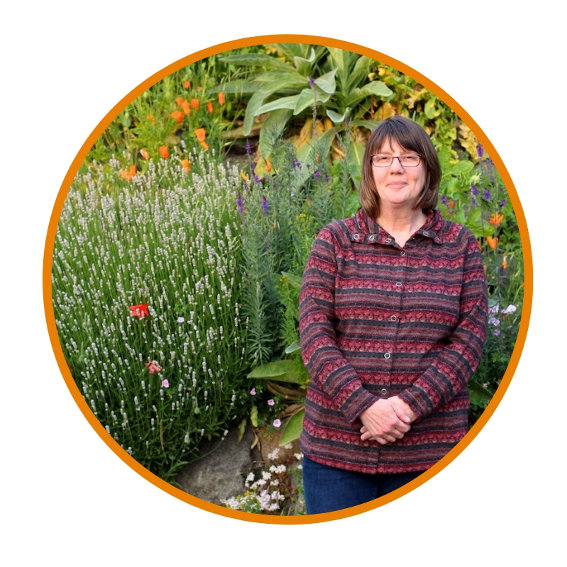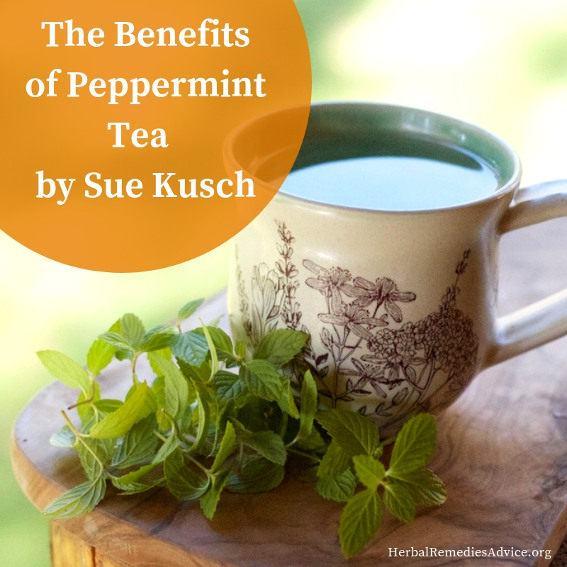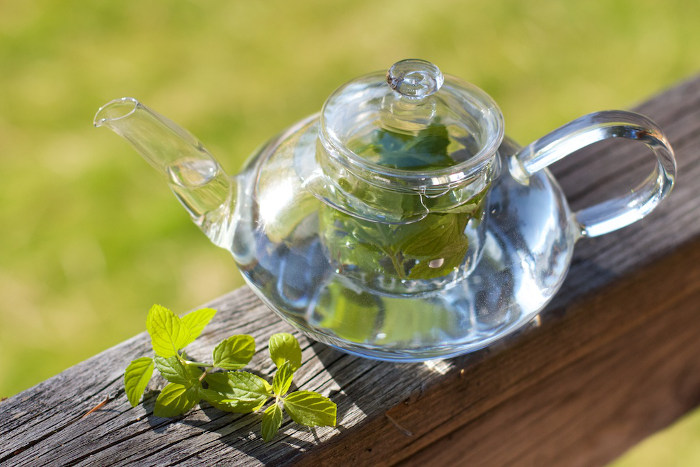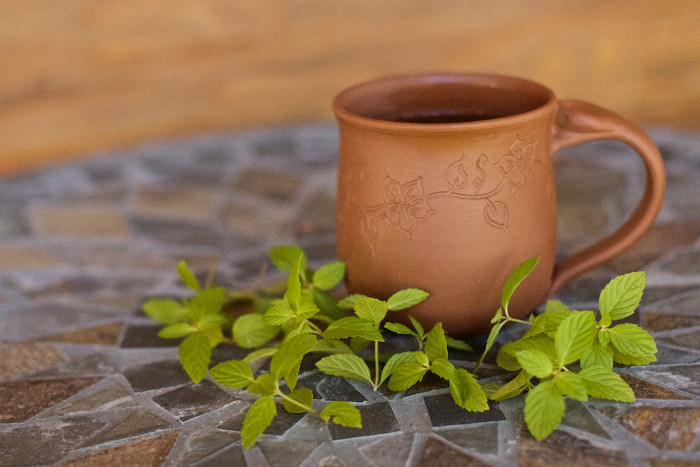Get weekly tips, recipes, and my Herbal Jumpstart e-course! Sign up for free today.

The Benefits of Peppermint Tea
By Sue Kusch
Share this! |
|
Can the benefits of peppermint tea turn your day around? I know that sounds like the kind of marketing hype that causes our eyes to roll but hear me out.
Several days ago, I’d spent the morning working under an impending project due date. I was interrupted several times by phone calls, including one from an upset family member. I was struggling with focus so I headed to an early lunch, indulging in my kind of comfort food: leftover spicy stir-fried vegetables with udon noodles. As good as it tasted, I quickly realized that I ate mindlessly, eating too quickly and too much. Back at my desk and computer screen, I grabbed a cup of coffee and went to work on my project.
It didn’t take long for my digestive system to register its complaints: indigestion, bloating and mild intestinal cramps from what I call “vegetable gas.” The inside of my mouth was feeling the slight burning effects of my spicy indulgence, along with a sour taste from the hours-old coffee.
By mid-afternoon, I could feel the symptoms of a tension headache: mild pressure throughout my head, as if I had on a too-tight cap encircling my head. My eyes were tired, and my lower back ached from sitting without movement. With the deadline looming, I knew I needed something to help me relax, focus and feel better.
As an herbal tea drinker, I enjoy creating my own tea blends, many of them with a variety of herbs. It’s easy to become focused on the taste rather than the medicinal benefits or, in the case of my sleep tea blend, overemphasize medicinal benefits and pack in as many relaxing and sedating herbs as possible.
A quick look at my tea blends revealed that I didn’t have a blend specific to my current complaints. I headed outside for fresh air and to give my eyes a break and found my remedy growing in my front north-facing garden bed.
Peppermint! I stripped off a handful of fresh leaves, placed them in my teapot, and added just-boiled water. Ten minutes later, I sat down with my extra large mug of herbal peppermint tea and drank the tea slowly.
I am a bit amused with the different approaches I have when drinking coffee and tea. I bring coffee to my desk - it’s one of my productivity tools. But I tend to sit in a comfortable chair, relaxing or reading in silence, sipping slowly when drinking herbal tea.
Within seconds the inside of my mouth felt cooled and refreshed. Within minutes my indigestion was relieved and my bloated feeling was lessening. Within the hour, my “vegetable gas” was dispelled (fortunately I work from home)!
I returned to my project, with another full mug of herbal peppermint tea and felt renewed. My tension headache was gone partly because I took a break, focused my eyes on the distant horizon for a few minutes and because of peppermint’s analgesic (pain-relieving) properties.
The Health Benefits of Peppermint Tea
Though there have been no human clinical trials on the health benefits of peppermint tea, historical writings and evidence-based research recognizes peppermint as a potent medicinal herb. Peppermint is one of the better-known carminatives: an herb that can relieve indigestion, dispel gas and lessen bloating.
Peppermint leaves contain a high amount of menthol, which offers strong antispasmodic actions, calming the muscles in the walls of the stomach and alleviating intestinal cramps associated with excessive gas.
Relaxing tense muscles is one way to eliminate a tension headache and drinking peppermint tea, combined with the purposeful and relaxing act of drinking tea, can be helpful in reducing the pain of headaches.
Another way to utilize peppermint tea for tension headaches is to externally apply it using a fomentation, which is simply a washcloth soaked in cooled tea and applied to the forehead.
As a cooling herb with analgesic properties, herbal peppermint tea can help with itchy and inflamed conditions of the skin like rashes, hives and sunburn. Use the cooled tea as an external wash over the area or add several handfuls of peppermint leaves to a bath for a total body cool-down.
Another traditional use is to drink peppermint herbal tea when sick with a cold or influenza. The high amount of menthol in peppermint can help thin mucus, loosen phlegm and reduce the symptoms of a stuffy nose.
It also works well to relieve the discomfort you feel from fevers, especially when you feel hot and restless.
After my tea break and two mugs of tea, I finished my project by the deadline and rewarded myself with a long walk, contemplating the benefits of single cup of peppermint herbal tea.
Are You Ready to Enjoy the Benefits of Peppermint Tea?
Here are some peppermint tea recipes from Rosalee.
Herbal Peppermint Tea Recipe with Fresh Peppermint Leaves
Fresh Peppermint Water
Coarsely chop a small handful of fresh peppermint and add it to a quart glass jar. Fill the jar with cool water and let sit for a minimum of 30 minutes and up to 8 hours. Strain off the fresh peppermint and enjoy this lightly flavored peppermint water within 36 hours.
Herbal Peppermint Tea Recipe with Dried Peppermint Leaves
Simple Peppermint Herbal Tea:
Infuse 1 teaspoon of finely cut peppermint leaves into 12 ounces of just-boiled water. Cover it and let steep for 3 to 5 minutes. Strain. If you like it sweet add honey to taste, and enjoy the benefits of peppermint tea.
Digest and Rest Tea
If you want to get fancy, try this peppermint tea formula, it’s one of Rosalee’s favorites.
- 1 tablespoon dried chamomile
- 1 tablespoon dried rose petals
- 1 teaspoon dried peppermint leaves
- pinch of dried lavender flowers
Place the dried herbs into a glass container. Steep in 16 ounces of just-boiled water, covered, for 10 minutes. Strain. If desired, add honey to taste. Enjoy while warm.

Sue Kusch, a former community college instructor and academic advisor, incorporates her experiential wisdom, expertise and science-based research garnered from her three decades of growing vegetables, fruit and herbs into her educational writing about plants and how people use them. In addition to her BA in Social Sciences and Masters in Education, she completed the Master Gardener training in 2011 and two permaculture courses in 2001 and 2014. She has studied medicinal and nutritional uses of herbs, including studies at Herbmentor and East West School of Planetary Herbology, since 1997. An avid reader, lover of historical and folkloric information, and a promising storyteller, Sue writes about the intersection of plants and people.


